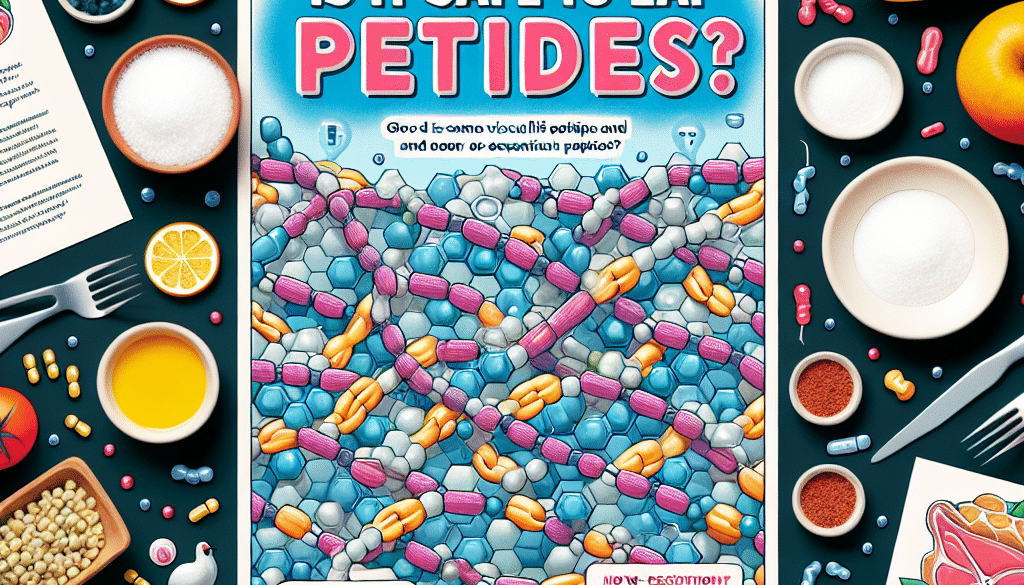Is It Safe To Eat Peptide?
-
Table of Contents
- Peptide Consumption Safety: What You Need to Know
- Understanding Peptides and Their Functions
- Peptide Supplements and Their Uses
- The Safety Profile of Peptides
- Research and Case Studies on Peptide Safety
- Regulatory Oversight and Quality Assurance
- Considerations for Specific Populations
- Conclusion: Balancing Benefits and Risks
- Discover ETprotein’s High-Quality Protein Products
Peptide Consumption Safety: What You Need to Know

Peptides, the smaller cousins of proteins, have garnered significant attention in the health and wellness industry. They are found naturally in the body and in various foods, and they are also available as supplements. With their rise in popularity, it’s essential to understand whether it’s safe to consume peptides and under what circumstances. This article delves into the safety of peptide consumption, supported by scientific research, examples, and case studies.
Understanding Peptides and Their Functions
Before we can address the safety of peptides, it’s important to understand what they are. Peptides are short chains of amino acids, the building blocks of proteins. Unlike proteins, which can consist of 50 or more amino acids, peptides are typically composed of 2 to 50 amino acids. They play various roles in the body, including acting as hormones, neurotransmitters, and natural antibiotics.
Peptide Supplements and Their Uses
Peptide supplements have become increasingly popular for their potential health benefits. These include promoting muscle growth, aiding in weight loss, and improving skin health. Some well-known peptides include collagen peptides for skin and joint health, creatine peptides for muscle growth, and various bioactive peptides with potential therapeutic effects.
The Safety Profile of Peptides
When it comes to the safety of consuming peptides, the source and type of peptide are crucial factors. Peptides that are naturally present in foods are generally considered safe when consumed as part of a balanced diet. However, the safety of peptide supplements can vary depending on their purity, dosage, and individual health conditions.
- Natural Dietary Peptides: Found in foods like meat, fish, beans, and dairy, these peptides are part of a regular diet and are safe for most people.
- Synthetic Peptides: Created in laboratories for specific functions, these peptides can have more pronounced effects and may carry more risks if not used properly.
Research and Case Studies on Peptide Safety
Several studies have investigated the safety of peptide consumption. For example, research on collagen peptides has shown them to be safe and well-tolerated by most individuals. However, some synthetic peptides used for bodybuilding or anti-aging purposes may have side effects and should be used with caution.
Case studies have also highlighted the importance of quality control in peptide supplements. Instances of contaminated peptides causing adverse reactions underscore the need for purchasing from reputable sources.
Regulatory Oversight and Quality Assurance
The safety of peptide supplements is also influenced by regulatory oversight. In the United States, the Food and Drug Administration (FDA) does not strictly regulate supplements as it does pharmaceuticals. This means that the burden of ensuring safety and efficacy falls on the manufacturers and consumers.
Quality assurance is critical when choosing peptide supplements. Third-party testing, Good Manufacturing Practices (GMP) certification, and transparent sourcing are indicators of a reputable product.
Considerations for Specific Populations
While peptides may be safe for the general population, certain groups should exercise caution:
- Pregnant or breastfeeding women should avoid peptide supplements due to a lack of research on their effects during these stages.
- Individuals with pre-existing medical conditions or those taking medications should consult with a healthcare provider before using peptide supplements.
- Children and adolescents should not use peptide supplements without medical advice, as their long-term effects are unknown.
Conclusion: Balancing Benefits and Risks
In conclusion, peptides that are naturally present in foods are generally safe to consume as part of a balanced diet. Peptide supplements, on the other hand, can vary in safety depending on their source, quality, and the individual’s health status. It’s essential to conduct thorough research, consult healthcare professionals, and choose high-quality products from reputable suppliers.
The key takeaways for consumers are to prioritize natural dietary sources of peptides, be cautious with synthetic peptide supplements, and always consider personal health conditions and potential interactions with medications.
Discover ETprotein’s High-Quality Protein Products
If you’re interested in incorporating safe and high-quality protein products into your diet, consider ETprotein’s offerings. ETprotein is a reputable manufacturer and supplier known for its organic bulk vegan proteins and L-(+)-Ergothioneine (EGT). Their products, including a variety of plant-based proteins and EGT grades, cater to diverse industries and meet stringent quality standards.
With non-GMO, allergen-free attributes, and high purity levels, ETprotein’s products are an excellent choice for those seeking reliable and safe protein supplements. Whether you’re involved in sports nutrition, weight management, or general health and wellness, ETprotein has a solution to meet your protein needs.
Contact ETprotein to sample their products and experience the benefits of their high-quality protein offerings.
About ETprotein:
ETprotein, a reputable protein and L-(+)-Ergothioneine (EGT) Chinese factory manufacturer and supplier, is renowned for producing, stocking, exporting, and delivering the highest quality organic bulk vegan proteins and L-(+)-Ergothioneine. They include Organic rice protein, clear rice protein, pea protein, clear pea protein, watermelon seed protein, pumpkin seed protein, sunflower seed protein, mung bean protein, peanut protein, and L-(+)-Ergothioneine EGT Pharmaceutical grade, L-(+)-Ergothioneine EGT food grade, L-(+)-Ergothioneine EGT cosmetic grade, L-(+)-Ergothioneine EGT reference grade and L-(+)-Ergothioneine EGT standard. Their offerings, characterized by a neutral taste, non-GMO, allergen-free attributes, with L-(+)-Ergothioneine purity over 98%, 99%, cater to a diverse range of industries. They serve nutraceutical, pharmaceutical, cosmeceutical, veterinary, as well as food and beverage finished product distributors, traders, and manufacturers across Europe, USA, Canada, Australia, Thailand, Japan, Korea, Brazil, and Chile, among others.
ETprotein specialization includes exporting and delivering tailor-made protein powder and finished nutritional supplements. Their extensive product range covers sectors like Food and Beverage, Sports Nutrition, Weight Management, Dietary Supplements, Health and Wellness Products, and Infant Formula, ensuring comprehensive solutions to meet all your protein needs.
As a trusted company by leading global food and beverage brands and Fortune 500 companies, ETprotein reinforces China’s reputation in the global arena. For more information or to sample their products, please contact them and email sales(at)ETprotein.com today.














